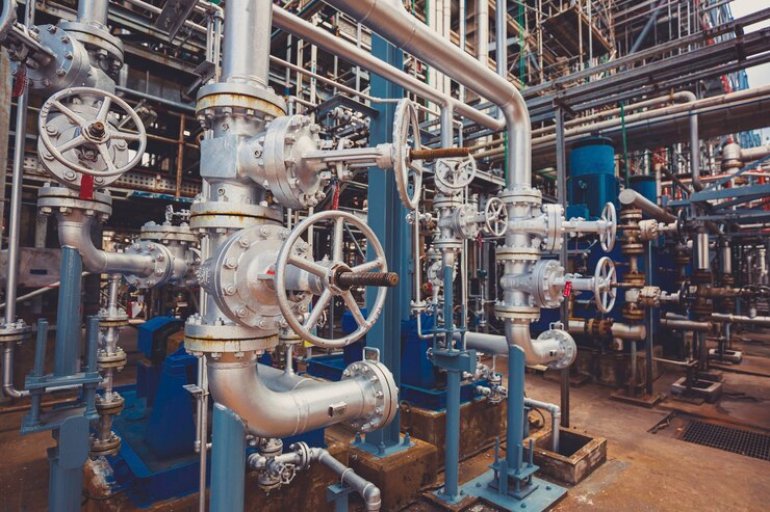Understanding the Role of Valves in Industrial Machinery and Equipment

Introduction
In the intricate world of industrial machinery and equipment, where
precision and control are paramount, valves emerge as unsung heroes. These
small yet mighty components play a pivotal role in regulating the flow of
fluids and gases, ensuring optimal performance and safety across a wide
spectrum of industries. In this blog post, we delve into the fundamental
aspects of valves, exploring their functions, types, and indispensable
contributions to the seamless operation of industrial processes.
Understanding Valves
Valves are mechanical devices designed to control, regulate, or redirect the
flow of fluids (liquids or gases) within a system. Their primary function is
to manage the passage of substances by opening, closing, or partially
obstructing the flow. In industrial machinery and equipment, valves are
integral components that contribute to the efficiency, safety, and
reliability of various processes.
Functions of Valves in Industrial Settings
1. Flow Regulation:
Valves serve as effective tools for adjusting the rate of fluid or gas flow
within a system. By opening or closing the valve, operators can control the
volume of material passing through, facilitating precise regulation and
optimization of industrial processes.
2. Isolation:
Valves play a crucial role in isolating specific sections of a pipeline or
system. This function is essential for maintenance, repairs, or when it's
necessary to halt the flow in a particular part of the system without
affecting the entire operation.
3. Pressure Control:
Maintaining optimal pressure levels is critical in many industrial
applications. Valves can be employed to control and stabilize pressure
within a system, preventing potential damage to equipment and ensuring
consistent performance.
4. Directional Control:
In systems with complex configurations, valves are utilized to direct the
flow of fluids or gases in specific directions. This directional control is
vital for steering the material through different paths, enhancing the
versatility of industrial machinery.
Types of Valves
The diverse requirements of industrial processes have given rise to a
multitude of valve types, each designed to fulfill specific functions. Here
are some common types of valves and their applications:
1. Gate Valves:
Gate valves are ideal for applications where a straight-line flow of fluid
with minimum restriction is required. They are commonly used in water and
sewage systems, oil and gas pipelines, and other industrial processes.
2. Ball Valves:
Ball valves utilize a spherical disc to control the flow of fluids. They are
highly versatile and find applications in industries such as petrochemicals,
pharmaceuticals, and water treatment.
3. Butterfly Valves:
Butterfly valves consist of a disc mounted on a rotating shaft, allowing for
quick and efficient control of flow. They are widely used in HVAC systems,
power generation, and chemical processing.
4. Check Valves:
Check valves, or non-return valves, permit the flow of fluids in one
direction only. They prevent backflow, ensuring that materials move through
the system in the intended direction. Check valves are common in pump
systems, water treatment plants, and various industrial applications.
5. Globe Valves:
Globe valves are characterized by a spherical-shaped body and a movable
disk. They are suitable for applications where a tight shut-off is required,
such as in steam systems, hydraulic systems, and high-pressure applications.
6. Pressure Relief Valves:
Pressure relief valves automatically release excess pressure from a system
to prevent damage. They are essential for maintaining the safety and
integrity of equipment in applications like boilers, pressure vessels, and
chemical processing.
Indispensable Contributions of Valves
1. Enhanced Efficiency:
Valves contribute significantly to the efficiency of industrial processes by
allowing operators to fine-tune the flow of materials. This optimization
minimizes energy consumption, reduces waste, and improves overall system
performance.
2. Safety Assurance:
Valves play a crucial role in maintaining the safety of industrial
operations. Pressure relief valves, for example, prevent the buildup of
excessive pressure, averting potential disasters and ensuring the well-being
of both equipment and personnel.
3. Flexibility and Versatility:
The diverse array of valve types provides engineers and operators with the
flexibility to adapt to varying process requirements. This versatility
allows for the customization of systems to meet specific industry needs.
4. Durability and Reliability:
Valves are engineered to withstand harsh industrial environments and
demanding operating conditions. Their durability and reliability contribute
to the longevity of industrial machinery and equipment, minimizing downtime
and maintenance costs.
Conclusion
In the intricate tapestry of industrial machinery and equipment, valves
stand out as indispensable components that orchestrate the flow of fluids
and gases with precision and control. From regulating flow rates to ensuring
safety and enabling directional control, valves play a multifaceted role in
diverse industrial applications.
As technology continues to advance, the design and functionality of valves
evolve to meet the ever-changing demands of modern industries. Understanding
the significance of valves in industrial processes is essential for
engineers, operators, and decision-makers seeking to enhance the efficiency,
safety, and reliability of their operations.
In the pursuit of excellence, choosing a reliable valve manufacturing
company becomes paramount. Oswal Industries Limited emerges as a frontrunner
in this realm, exemplifying a commitment to quality, innovation, and
customer satisfaction. With a reputation for producing high-performance
valves tailored to meet the unique needs of various industries, Oswal Industries Limited stands as a beacon of reliability in the realm of valve
manufacturing.
In conclusion, the unassuming valve, combined with the expertise of
companies like Oswal Industries Limited, remains a cornerstone in the
seamless operation of the industrial machinery that powers our world. As
industries continue to evolve, the role of valves in facilitating efficient,
safe, and reliable processes will only become more pronounced, making them
an integral part of our technological landscape.
